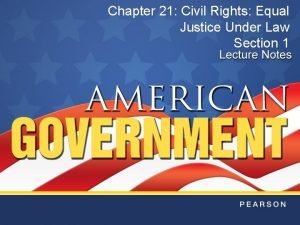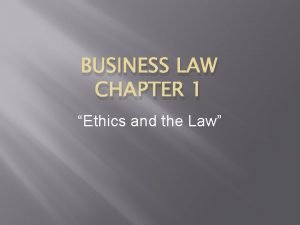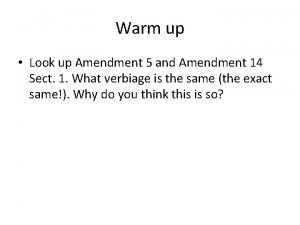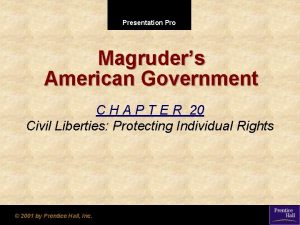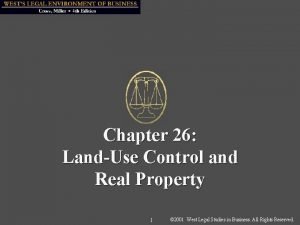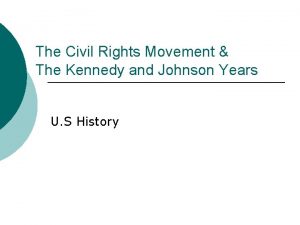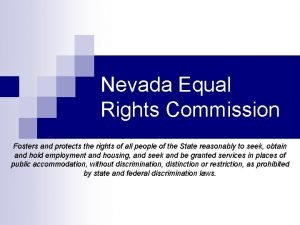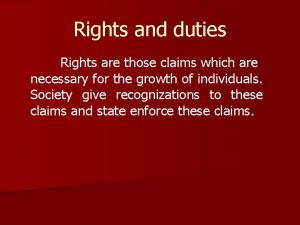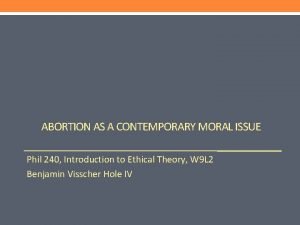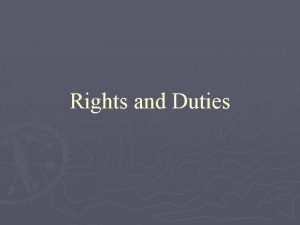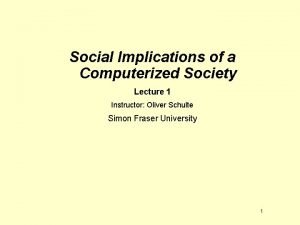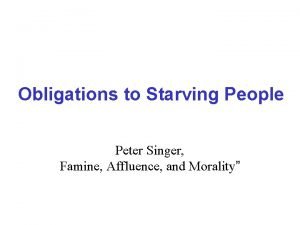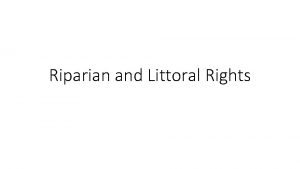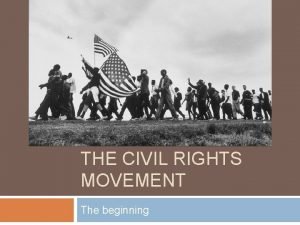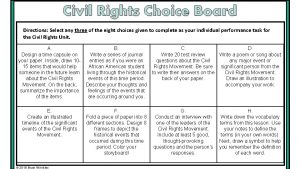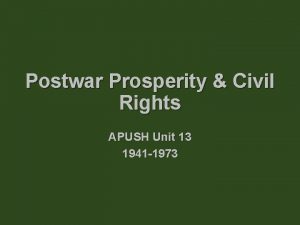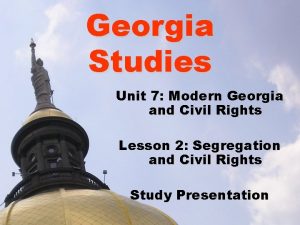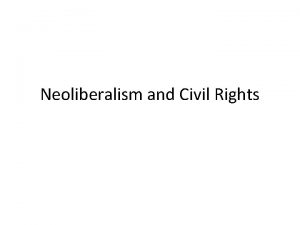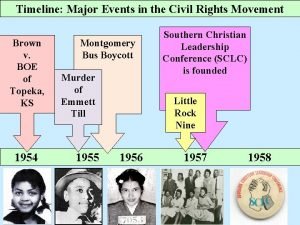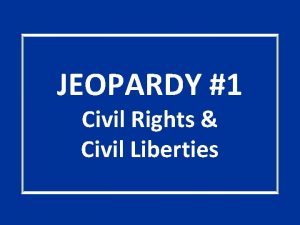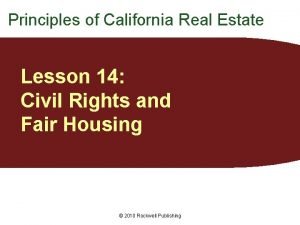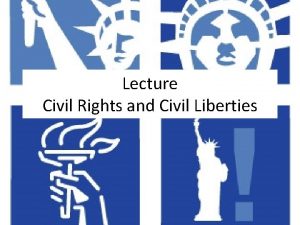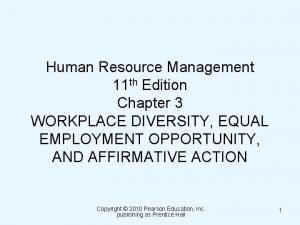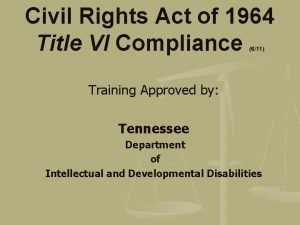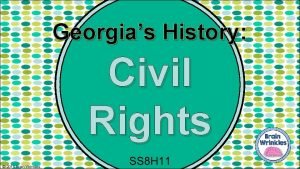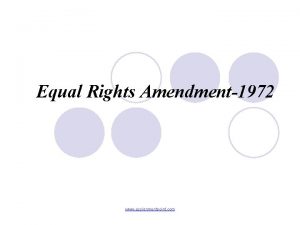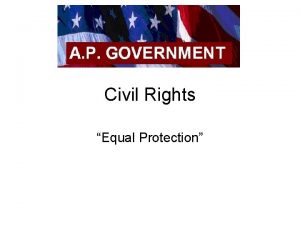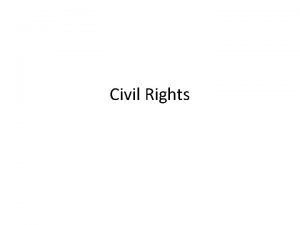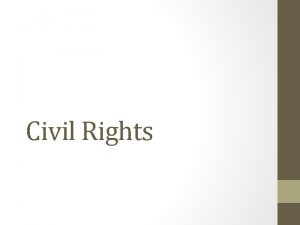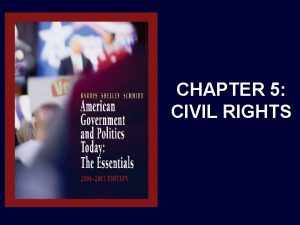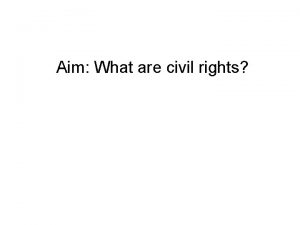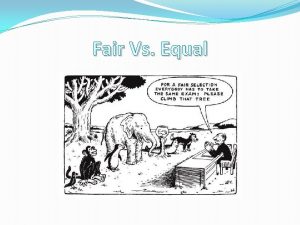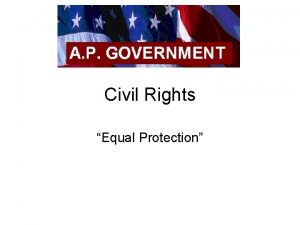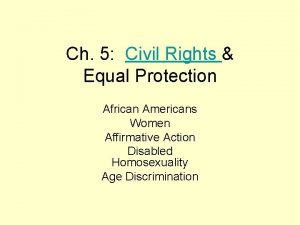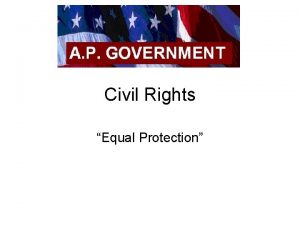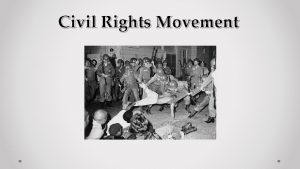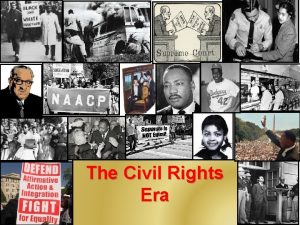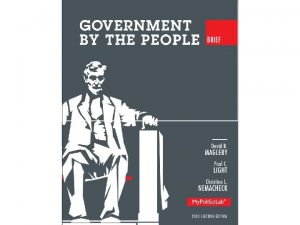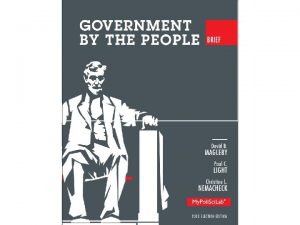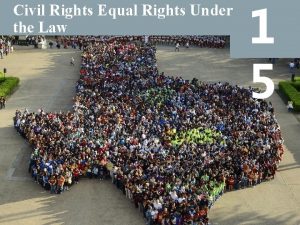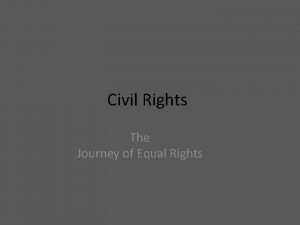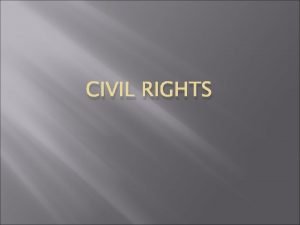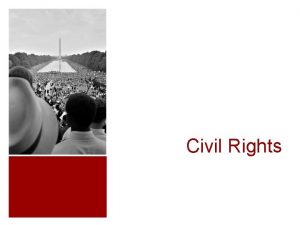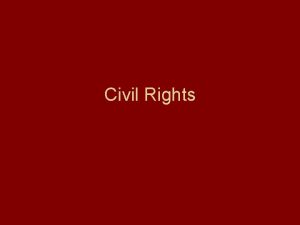Equal Protection The Evolution of Civil Rights Civil



































![Lower court in Harris The court found that some of Hardy's comments "offended [Harris], Lower court in Harris The court found that some of Hardy's comments "offended [Harris],](https://slidetodoc.com/presentation_image_h2/566d4f51a886acf972b6935f1f37feff/image-36.jpg)








- Slides: 44

Equal Protection The Evolution of Civil Rights

Civil Rights Legal provisions emanating from the concept of equality Issues involving the status of persons with shared characteristics who have historically been disadvantaged in some way

Fourteenth Amendment Equal Protection Clause: “Nor shall any State…deny to any person within its jurisdiction the equal protection of the laws. ” Congress (who drafted the amendment) was concerned primarily with the danger of the states (esp. in the South) imposing discriminatory laws.

Fourteenth Amendment cont… Outlaws a denial of equal protection of the laws Prohibits discrimination—any person within a state’s jurisdiction is entitled to be be treated equitable, to be free from arbitrary and unreasonable treatment at the hands of state government

Equal Protection General Observations COMPETING VALUES in SOCIETY: FREEDOM, ORDER, LIBERTY Does not forbid ALL discrimination. ALL law discriminates—certain interests over other interests --classifies you and favors certain people over others Goal is to stamp out certain classifications—must have a rational basis

Equal Protection p. 2 Considerable philosophical disagreement about proper interpretation Liberals= equality of results—a responsibility Conservatives= equality of opportunity at the starting line

Equal Protection p. 3 Two elements to a violation Must prove some form of unequal treatment Not all discrimination is unconstitutional (ex. college admissions based on grades) Must not be arbitrary and capricious, without a rational basis There must be a state action

Three Tests of Equal Protection Strict Scrutiny: Race is a “suspect classification” a history of discrimination & immutable characteristics (discrete and insular minorities that have experienced a history of unequal treatment and lack of political power) Any law or governmental action that uses race as a classification is presumed unconstitutional

Strict Scrutiny cont… The burden is on the state to prove the law should be upheld. The court has concluded that compelling state interest are rarely (if ever) served by treating people differently according to race. Exception—Korematsu: war time. Religion and nationality are also included in this category.

Important justification Gender-- Craig v. Boren in 1976. Oklahoma law= males had to be 21 years old to drink and females only 18 yrs. old. The state argued that women mature faster and men have a higher rate of drinking and driving. The Court was not persuaded by the statistics and gave heightened scrutiny to a gender classification.

Craig v. Boren cont. … Government has to show an important (more than rational and less than compelling) interest. Burden is kind of on the shoulder of the state to demonstrate a strong interest in writing such a law based on a gender distinction Ruth Bader Ginsburg as attny. for Craig This case motivated the movement for the ERA.

Reasonableness/Rational Basis Test Not capricious or arbitrary Age—Massachusetts v. Murgia (1976) a state law saying police officers must stop being policy officers at the age of 50 Compulsory retirement even though Dr. said Murgia was in perfect health The test is reasonableness. Legislating on the basis of age is different—not long history of discrimination (not a suspect classification).

Rational Basis Test cont… Deference to legislature—assume constitutional. The plaintiff must prove that the age classification/regulation based on age is capricious and arbitrary. Burden of Proof What about insurance? Not a state but a business. Only public discrimination is restricted, not private.

Basic Questions Who may not discriminate? 14 th Amendment applies to the STATES 5 th Amendment Due Process Clause applies to the federal government. Any discriminatory action by a state found to be in violation of the Equal Protection Clause would also be a violation of the Fifth Amendment if engaged in by the federal government

Basic Questions cont… Who may not discriminate? Civil rights cases of 1883. The Court said only related to acts of government based on the language of the 14 th Amendment. Shelly v. Kramer (1948): “Restricted covenant. ” Only sell to white people WHO’S perpetuating the discrimination? Private individual is not reachable. Restrictive covenants are legal per se. BUT, needed the court to intervene to carry out the order. State court now involved in enforcing the discrimination. May not do so. Turned private discrimination into public discrimination.

Who may not discriminate? Burton v. Wilmington Parking Authority (1961): The city rented some space in a parking garage and an adjacent coffee shop refuses to serve blacks. Involves the state. Moose Lodge #107 v. Irvis (1972): Irvis was a black member of the Pennsylvania legislature and the Lodge refused to serve him because he was black. Argued that the state issued liquor licenses and therefore the state was involved in enforcing the discrimination. The Supreme Court rejected that argument because the involvement to the state was too remote.

Civil Rights Act of 1964 The most comprehensive civil rights statute ever. Regulating discrimination in employment, education, and public accommodations Placed restrictions on federal $ to ensure non-discrm. was being followed COMMERCE CLAUSE of Article I

What type of discrimination is illegal? De Jure: discrimination in written law. The law specifies white superiority/segregation. De Facto: in FACT—took it off the books but still discriminated in actions. There must be a pattern. Ex. Washington v. Davis (1976): D. C. police department hiring police officers and gave a civil service exam. 4 x the number of blacks failed as the number of whites. Court said their must be there must be evidence of intent.

What are the remedies? UC Davis v. Bakke (19? )—Race may be a factor when accepting applications from students but it may not be the sole consideration for setting aside seats based on race. Overall, quotas established by the federal government and Congress are okay but less okay if coming from states and localities.

History of Racial Discrimination “Separate but equal” era Plessy v. Ferguson (1896) According to the Court, separation did not constitute inequality under the 14 h am. Ushered in full-scale segregation in the southern and border states Swett v. Painter (1950): A black man was allowed into the Texas Law School but the Court refused to overturn Plessy

Racial Discrimination cont… Brown v. Board of Education (1954) Most significant decisions of the 20 th Century Challenged official racial segregation in the nation’s primary and secondary public schools The Court considered more than just physical inequality but weighed the psychological effect of racial segregation Overturned Plessy doctrine

Brown v. Board cont… Asked attorneys to return the next year and argue the issue of remedy Brown II “with all deliberate speed” Not too much impact but spurred the Civil Rights movement

Desegregation The Supreme Court gave district courts the broad power of implementing desegregation Teacher placement School construction and maintenance Staff assignment Funding equalization

Desegregation cont… Limits on District court authority The court must determine that a particular district has violated the Constitution (no blanked policies for all school districts, such as bussing) The remedy must be narrowly tailored to compensate for the violation

Equal Protection and Gender Discrimination

History Bradwell v. Illinois (1873) Bradwell was denied a license to practice law solely because of her sex. The Supreme Court upheld the state’s action “The natural power and proper timidity and delicacy which belongs to the female sex evidently unfits it for many of the occupations of civil life. ” Minor v. Happersett (1875): denied women the right to vote

History of Gender Discrimination Goesaert v. Cleary (1948) Declared a Michigan law valid that barred a woman from becoming bartender, unless her family owned the bar. Reed v. Reed (1971) Idaho law: In competing competition over estate inheritances, “males must be preferred to females” The S. Ct. ruled that laws containing overbroad, sex-based assumptions violate the equal protection clause. Rational basis test was used rather than strict scrutiny.

Craig v. Boren (1976) Oklahoma law= males had to be 21 years old to drink and females only 18 yrs old. The state argued that women mature faster and men have a higher rate of drinking and driving. Ginsburg was the attorney that argued the case before the Court The Court was not persuaded by the statistics and gave heightened scrutiny to a gender classification.

Craig v. Boren cont… Problem: males and no history of discrimination therefore no strict scrutiny The strict scrutiny advocates had to compromise. The battle is not over. Under the Court’s Equal Protection jurisprudence, which requires “an exceedingly persuasive justification” for a gender-based classification, it remains an open question whether “classification based on gender are inherently suspect. ”

US v. Virginia (1996) VMI or the “Citadel” was a publicly funded institution of higher learning with a single-sex admissions policy. Virginia tried to create a parallel women only institution but the courts concluded that VWIL was not equal

US v. UVA cont… The S. Ct. , while not wanting to compare sex discrimination to racial discrimination, said the burden in on the state to give an “exceedingly persuasive” reasoning for the classification The concurring and dissenting opinions pointed out that “exceedingly persuasive is beyond the intermediate scrutiny

Rostker v. Goldberg (1981) Whether drafting men into the armed forces and not women violates Equal Protection Congress’s power in raise and maintain a military is very clear in the Constitution Not only is their power in this area broad but clearly their expertise far surpasses that of the courts (“lack of competence on the part of the Court is marked. ”)

Rostker v. Goldberg cont… Congress debated extensively on this issue and determined that there was a compelling reason; it wasn’t based on a traditional, stereotypical notion of women Women are ineligible for combat and therefore are not drafted Dissent: The heightened scrutiny test should be used. The government's task in this case is to show that excluding women from registration substantially furthers the goal of preparing or a draft of combat troops.

Sexual Harassment Meritor Savings Bank v. Vinson (1986) Vinson claimed that she had been sexually harassed by her boss who continually demanded sexual favors for her The Court unanimously supported Vinson’s claim Ruling: The Ct. held that sexual harassment is actionable under the Civil rights Act of 1964. Do not have to prove loss of any tangible or econ. benefits. Hostile work environment Employer may be responsible as well

Harris v. Forklift (1993) Teresa Harris worked as a manager at Forklift Systems, Inc. , an equipment rental company, from April 1985 until October 1987. Charles Hardy was Forklift's president. The Magistrate found that, throughout Harris' time at Forklift, Hardy often insulted her because of her gender and often made her the target of unwanted sexual innuendos. Hardy told Harris on several occasions, in the presence of other employees, "You're a woman, what do you know" and "We need a man as the rental manager"; at least once, he told her she was "a dumb ass woman. " Again in front of others, he suggested that the two of them "go to the Holiday Inn to negotiate [Harris'] raise. " Hardy occasionally asked Harris and other female employees to get coins from his front pants pocket. He threw objects on the ground in front of Harris and other women, and asked them to pick the objects up He made sexual innuendos about Harris' and other women's clothing
![Lower court in Harris The court found that some of Hardys comments offended Harris Lower court in Harris The court found that some of Hardy's comments "offended [Harris],](https://slidetodoc.com/presentation_image_h2/566d4f51a886acf972b6935f1f37feff/image-36.jpg)
Lower court in Harris The court found that some of Hardy's comments "offended [Harris], and would offend the reasonable woman, " but that they were not "so severe as to be expected to seriously affect [Harris'] psychological well being. A reasonable woman manager under like circumstances would have been offended by Hardy, but his conduct would not have risen to the level of interfering with that person's work performance. PROOF of Severe Psychological Damage

Supreme Court conclusions takes a middle path between making actionable any conduct that is merely offensive and requiring the conduct to cause a tangible psychological injury.

Discrimination and Sexual Orientation Different than discrimination on the basis of race and/or sex There is no law that explicitly protects homosexuals. The US govt. itself has laws that discriminate against gays (Defense of Marriage Act, 1996) Also refuse to prohibit job discriminate on the basis of sexual orientation

Discrimination & Sexual Orientation cont… Romer v. Evans (1996) Challenged the Colorado State statue, which made sexual orientation an impermissible ground for discrimination claims The Court ruled (6 -3) that this was a violation of Equal Protection Clause of the 14 th Amen. A strong statement against laws that single out homosexuals for discriminatory treatment. RATIONAL BASIS

Other forms of Discrimination Economic Status Economic disadvantage is not longer a justification for denying a person full political and social rights The Court’s test depends on which right is being violated Shapiro v. Thompson (1969), a law that required welfare recipients to have lived in the state for one year. The Court rejected this stipulation (rational basis test)

Other forms of Discrimination: POOR people cont… Polling taxes struck down San Antonio Indep. School District v. Rodriguez (1973): The way some districts are funded disadvantages the poor The Court ruled that the disparities are not invidious discrimination Poor are not a suspect class=Rational basis test and education is not a fundamental right under the Constitution

Broadening the Civil Rights Umbrella: The Elderly and Disabled Several federal and state laws now bar mandatory retirement, and the courts have begun to strike down hiring practices based on age unless a compelling reason can be demonstrated Americans with Disabilities Act (1990) prohibits discrimination and requires reasonable efforts to increase accessibility in public facilities and places of employment was dramatically narrowed by the Supreme Court in 2001

Broadening the Civil Rights Umbrella: Gays and Lesbians 1969 “Stonewall rebellion” Bowers v. Hardwick (1986) Gains in high culture and mass entertainment Increasing tolerance in public attitudes Little national legislative success Some success at the state and local levels Biggest advances have been in the courts Romer v. Evans (1996): State laws designed to deny rights to homosexuals are unconstitutional (Colorado amendment) Lawrence v. Texas (2003): overturned Bowers

Other forms of Discrimination: Aliens, Age, etc. The Court has ruled that alienage is a suspect classification AGE=rational basis [Mass. v. Murgia, 1976]: The Court upheld as Mass. state law making it mandatory for state police officers to retire at age fifty Affirmative Action
 Chapter 21 civil rights equal justice under law
Chapter 21 civil rights equal justice under law Civil rights and civil liberties webquest
Civil rights and civil liberties webquest Equal height equal light
Equal height equal light Meridionalnet
Meridionalnet Taku komura
Taku komura Equal sharing is known as
Equal sharing is known as Sides opp. equal ∠s
Sides opp. equal ∠s Chapter 1 ethics and the law
Chapter 1 ethics and the law Equal protection clause
Equal protection clause Cr part 154
Cr part 154 Equal protection clause
Equal protection clause Equal protection clause of the 14th amendment
Equal protection clause of the 14th amendment Why did the struggle for equal rights intensify
Why did the struggle for equal rights intensify Kara jenkins nevada
Kara jenkins nevada Rights of the consumers
Rights of the consumers Moral duties
Moral duties Positive vs negative rights
Positive vs negative rights Legal rights and moral rights
Legal rights and moral rights Negative right
Negative right Positive vs negative rights
Positive vs negative rights What is negative right
What is negative right Littoral vs riparian
Littoral vs riparian Negative right
Negative right Union civil protection knowledge network
Union civil protection knowledge network Iivi luuk
Iivi luuk The civil rights movement
The civil rights movement Civil rights movement vocabulary
Civil rights movement vocabulary Civil rights choice board
Civil rights choice board Levittown apush
Levittown apush Unit 7: modern ga and civil rights
Unit 7: modern ga and civil rights What did the civil rights act of 1875 do
What did the civil rights act of 1875 do Cacfp civil rights
Cacfp civil rights Characteristics of civil rights
Characteristics of civil rights Civil rights training quiz answers
Civil rights training quiz answers Civil rights in child nutrition programs
Civil rights in child nutrition programs Civil rights timeline of events
Civil rights timeline of events Civil rights jeopardy
Civil rights jeopardy Unruh civil rights act real estate
Unruh civil rights act real estate Chapter 20 civil liberties protecting individual rights
Chapter 20 civil liberties protecting individual rights Usda civil rights training
Usda civil rights training Right to die
Right to die Title vii of the civil rights act
Title vii of the civil rights act Title vi of the civil rights act of 1964
Title vi of the civil rights act of 1964 Civil rights cloze notes 1
Civil rights cloze notes 1 Civil rights graphic organizer
Civil rights graphic organizer
